Assessing the Impact of COVID-19 on the Aviation Industry: A Report
VerifiedAdded on 2022/12/22
|7
|1285
|92
Report
AI Summary
This report examines the multifaceted impact of the COVID-19 pandemic on the aviation industry, focusing on operational and financial consequences. It discusses how airlines, specifically referencing British Airways, have suspended operations, faced reduced air traffic, and experienced significant financial losses due to lockdowns and decreased passenger demand. The report details the operational impacts, including grounded planes and cargo disruptions, and the financial repercussions, such as reduced aeronautical and non-aeronautical incomes. Furthermore, it explores future risks like changes in demand and financial instability, while also outlining measures such as cost reductions and airport-airline collaborations aimed at mitigating the pandemic's effects. The conclusion emphasizes the industry's resilience and the importance of adapting to overcome challenges and secure its future.
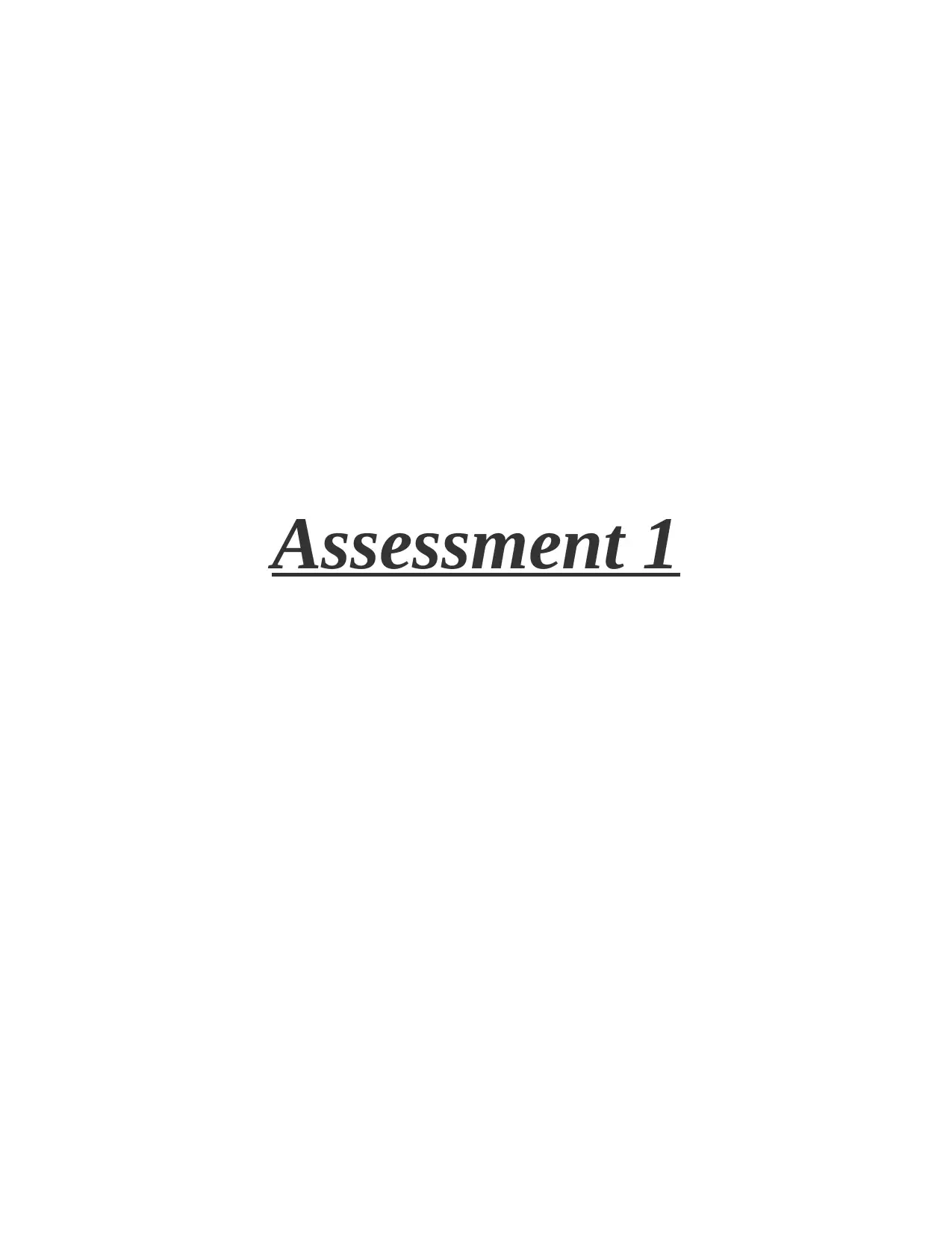
Assessment 1
Paraphrase This Document
Need a fresh take? Get an instant paraphrase of this document with our AI Paraphraser
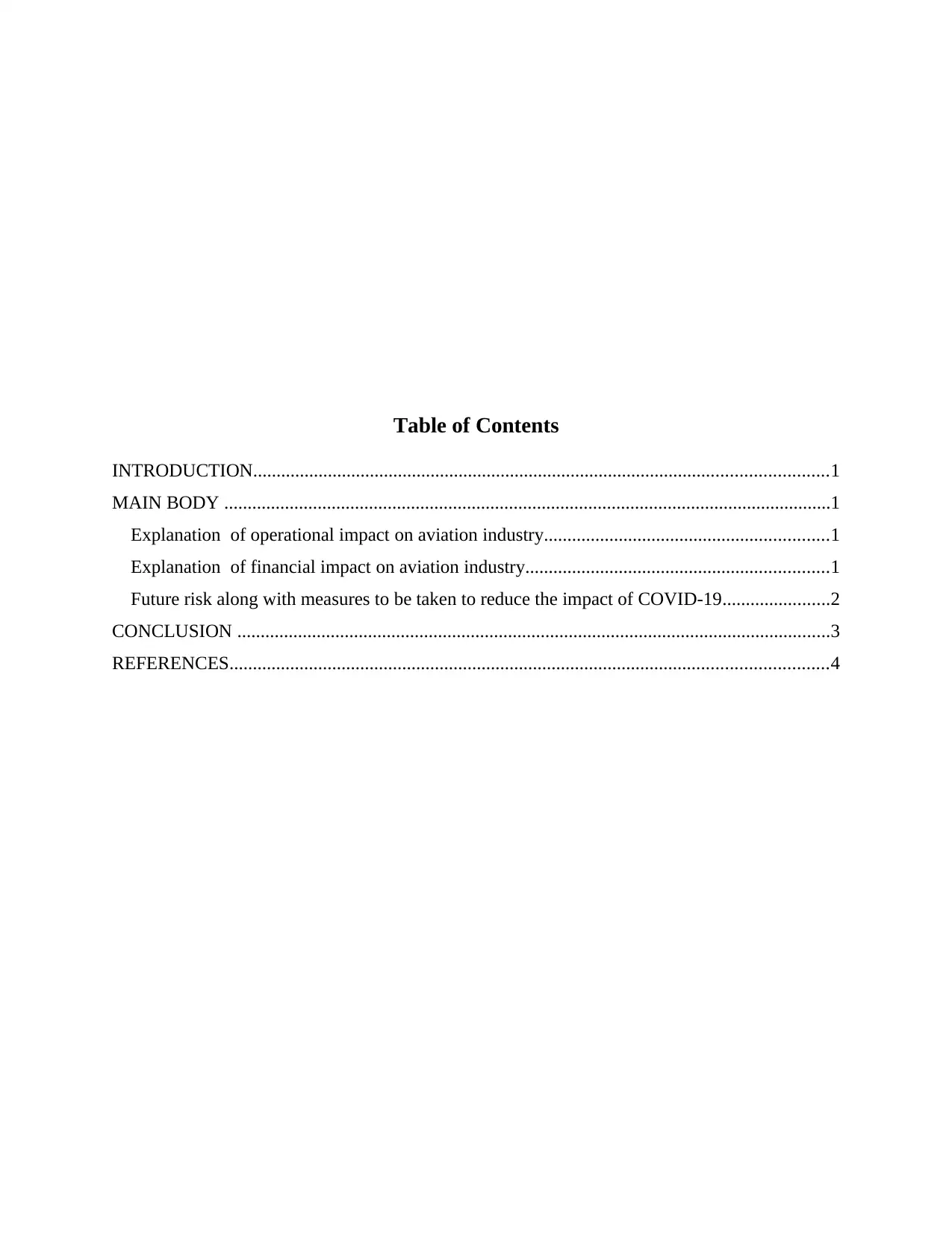
Table of Contents
INTRODUCTION...........................................................................................................................1
MAIN BODY ..................................................................................................................................1
Explanation of operational impact on aviation industry.............................................................1
Explanation of financial impact on aviation industry.................................................................1
Future risk along with measures to be taken to reduce the impact of COVID-19.......................2
CONCLUSION ...............................................................................................................................3
REFERENCES................................................................................................................................4
INTRODUCTION...........................................................................................................................1
MAIN BODY ..................................................................................................................................1
Explanation of operational impact on aviation industry.............................................................1
Explanation of financial impact on aviation industry.................................................................1
Future risk along with measures to be taken to reduce the impact of COVID-19.......................2
CONCLUSION ...............................................................................................................................3
REFERENCES................................................................................................................................4

⊘ This is a preview!⊘
Do you want full access?
Subscribe today to unlock all pages.

Trusted by 1+ million students worldwide
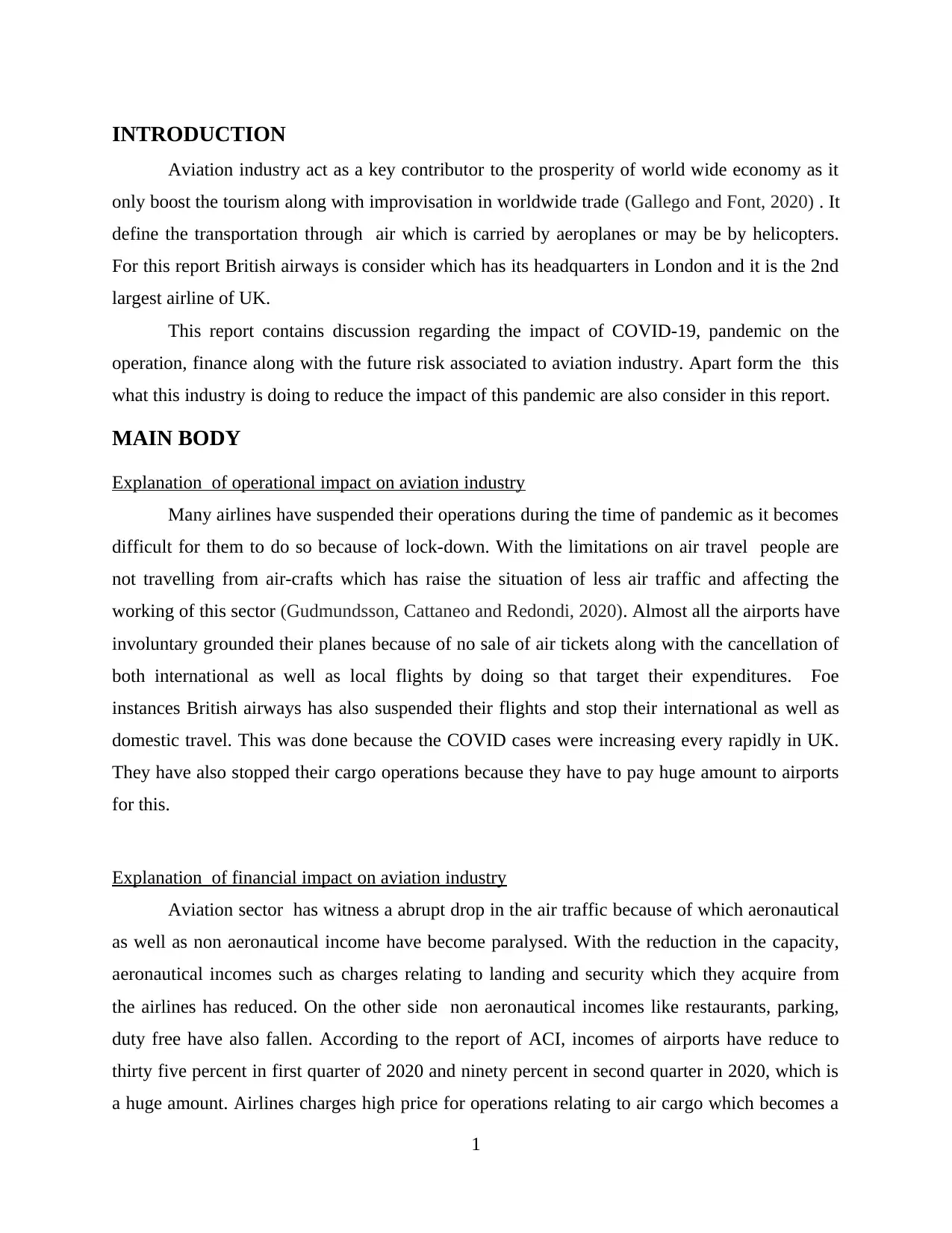
INTRODUCTION
Aviation industry act as a key contributor to the prosperity of world wide economy as it
only boost the tourism along with improvisation in worldwide trade (Gallego and Font, 2020) . It
define the transportation through air which is carried by aeroplanes or may be by helicopters.
For this report British airways is consider which has its headquarters in London and it is the 2nd
largest airline of UK.
This report contains discussion regarding the impact of COVID-19, pandemic on the
operation, finance along with the future risk associated to aviation industry. Apart form the this
what this industry is doing to reduce the impact of this pandemic are also consider in this report.
MAIN BODY
Explanation of operational impact on aviation industry
Many airlines have suspended their operations during the time of pandemic as it becomes
difficult for them to do so because of lock-down. With the limitations on air travel people are
not travelling from air-crafts which has raise the situation of less air traffic and affecting the
working of this sector (Gudmundsson, Cattaneo and Redondi, 2020). Almost all the airports have
involuntary grounded their planes because of no sale of air tickets along with the cancellation of
both international as well as local flights by doing so that target their expenditures. Foe
instances British airways has also suspended their flights and stop their international as well as
domestic travel. This was done because the COVID cases were increasing every rapidly in UK.
They have also stopped their cargo operations because they have to pay huge amount to airports
for this.
Explanation of financial impact on aviation industry
Aviation sector has witness a abrupt drop in the air traffic because of which aeronautical
as well as non aeronautical income have become paralysed. With the reduction in the capacity,
aeronautical incomes such as charges relating to landing and security which they acquire from
the airlines has reduced. On the other side non aeronautical incomes like restaurants, parking,
duty free have also fallen. According to the report of ACI, incomes of airports have reduce to
thirty five percent in first quarter of 2020 and ninety percent in second quarter in 2020, which is
a huge amount. Airlines charges high price for operations relating to air cargo which becomes a
1
Aviation industry act as a key contributor to the prosperity of world wide economy as it
only boost the tourism along with improvisation in worldwide trade (Gallego and Font, 2020) . It
define the transportation through air which is carried by aeroplanes or may be by helicopters.
For this report British airways is consider which has its headquarters in London and it is the 2nd
largest airline of UK.
This report contains discussion regarding the impact of COVID-19, pandemic on the
operation, finance along with the future risk associated to aviation industry. Apart form the this
what this industry is doing to reduce the impact of this pandemic are also consider in this report.
MAIN BODY
Explanation of operational impact on aviation industry
Many airlines have suspended their operations during the time of pandemic as it becomes
difficult for them to do so because of lock-down. With the limitations on air travel people are
not travelling from air-crafts which has raise the situation of less air traffic and affecting the
working of this sector (Gudmundsson, Cattaneo and Redondi, 2020). Almost all the airports have
involuntary grounded their planes because of no sale of air tickets along with the cancellation of
both international as well as local flights by doing so that target their expenditures. Foe
instances British airways has also suspended their flights and stop their international as well as
domestic travel. This was done because the COVID cases were increasing every rapidly in UK.
They have also stopped their cargo operations because they have to pay huge amount to airports
for this.
Explanation of financial impact on aviation industry
Aviation sector has witness a abrupt drop in the air traffic because of which aeronautical
as well as non aeronautical income have become paralysed. With the reduction in the capacity,
aeronautical incomes such as charges relating to landing and security which they acquire from
the airlines has reduced. On the other side non aeronautical incomes like restaurants, parking,
duty free have also fallen. According to the report of ACI, incomes of airports have reduce to
thirty five percent in first quarter of 2020 and ninety percent in second quarter in 2020, which is
a huge amount. Airlines charges high price for operations relating to air cargo which becomes a
1
Paraphrase This Document
Need a fresh take? Get an instant paraphrase of this document with our AI Paraphraser
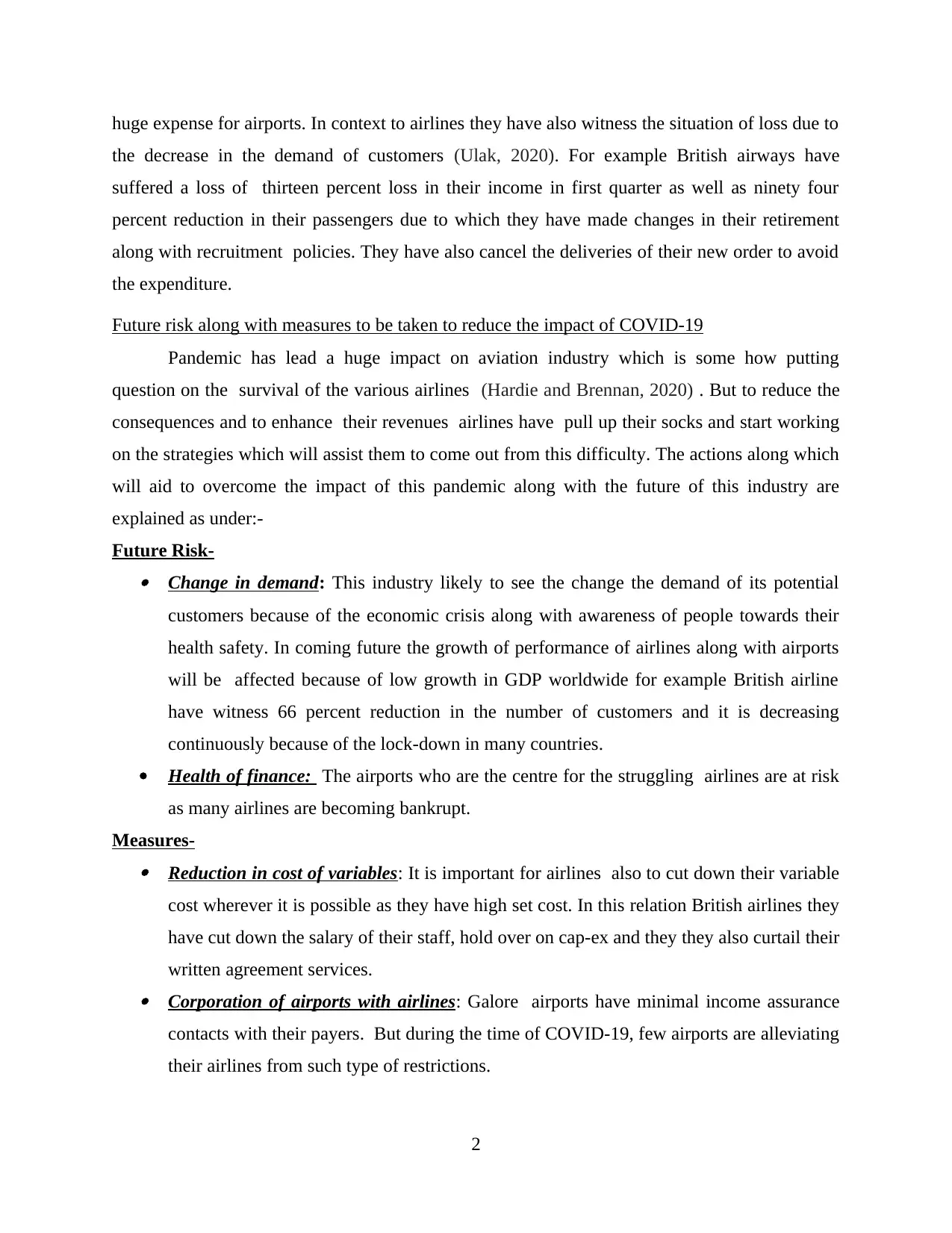
huge expense for airports. In context to airlines they have also witness the situation of loss due to
the decrease in the demand of customers (Ulak, 2020). For example British airways have
suffered a loss of thirteen percent loss in their income in first quarter as well as ninety four
percent reduction in their passengers due to which they have made changes in their retirement
along with recruitment policies. They have also cancel the deliveries of their new order to avoid
the expenditure.
Future risk along with measures to be taken to reduce the impact of COVID-19
Pandemic has lead a huge impact on aviation industry which is some how putting
question on the survival of the various airlines (Hardie and Brennan, 2020) . But to reduce the
consequences and to enhance their revenues airlines have pull up their socks and start working
on the strategies which will assist them to come out from this difficulty. The actions along which
will aid to overcome the impact of this pandemic along with the future of this industry are
explained as under:-
Future Risk- Change in demand: This industry likely to see the change the demand of its potential
customers because of the economic crisis along with awareness of people towards their
health safety. In coming future the growth of performance of airlines along with airports
will be affected because of low growth in GDP worldwide for example British airline
have witness 66 percent reduction in the number of customers and it is decreasing
continuously because of the lock-down in many countries.
Health of finance: The airports who are the centre for the struggling airlines are at risk
as many airlines are becoming bankrupt.
Measures- Reduction in cost of variables: It is important for airlines also to cut down their variable
cost wherever it is possible as they have high set cost. In this relation British airlines they
have cut down the salary of their staff, hold over on cap-ex and they they also curtail their
written agreement services. Corporation of airports with airlines: Galore airports have minimal income assurance
contacts with their payers. But during the time of COVID-19, few airports are alleviating
their airlines from such type of restrictions.
2
the decrease in the demand of customers (Ulak, 2020). For example British airways have
suffered a loss of thirteen percent loss in their income in first quarter as well as ninety four
percent reduction in their passengers due to which they have made changes in their retirement
along with recruitment policies. They have also cancel the deliveries of their new order to avoid
the expenditure.
Future risk along with measures to be taken to reduce the impact of COVID-19
Pandemic has lead a huge impact on aviation industry which is some how putting
question on the survival of the various airlines (Hardie and Brennan, 2020) . But to reduce the
consequences and to enhance their revenues airlines have pull up their socks and start working
on the strategies which will assist them to come out from this difficulty. The actions along which
will aid to overcome the impact of this pandemic along with the future of this industry are
explained as under:-
Future Risk- Change in demand: This industry likely to see the change the demand of its potential
customers because of the economic crisis along with awareness of people towards their
health safety. In coming future the growth of performance of airlines along with airports
will be affected because of low growth in GDP worldwide for example British airline
have witness 66 percent reduction in the number of customers and it is decreasing
continuously because of the lock-down in many countries.
Health of finance: The airports who are the centre for the struggling airlines are at risk
as many airlines are becoming bankrupt.
Measures- Reduction in cost of variables: It is important for airlines also to cut down their variable
cost wherever it is possible as they have high set cost. In this relation British airlines they
have cut down the salary of their staff, hold over on cap-ex and they they also curtail their
written agreement services. Corporation of airports with airlines: Galore airports have minimal income assurance
contacts with their payers. But during the time of COVID-19, few airports are alleviating
their airlines from such type of restrictions.
2
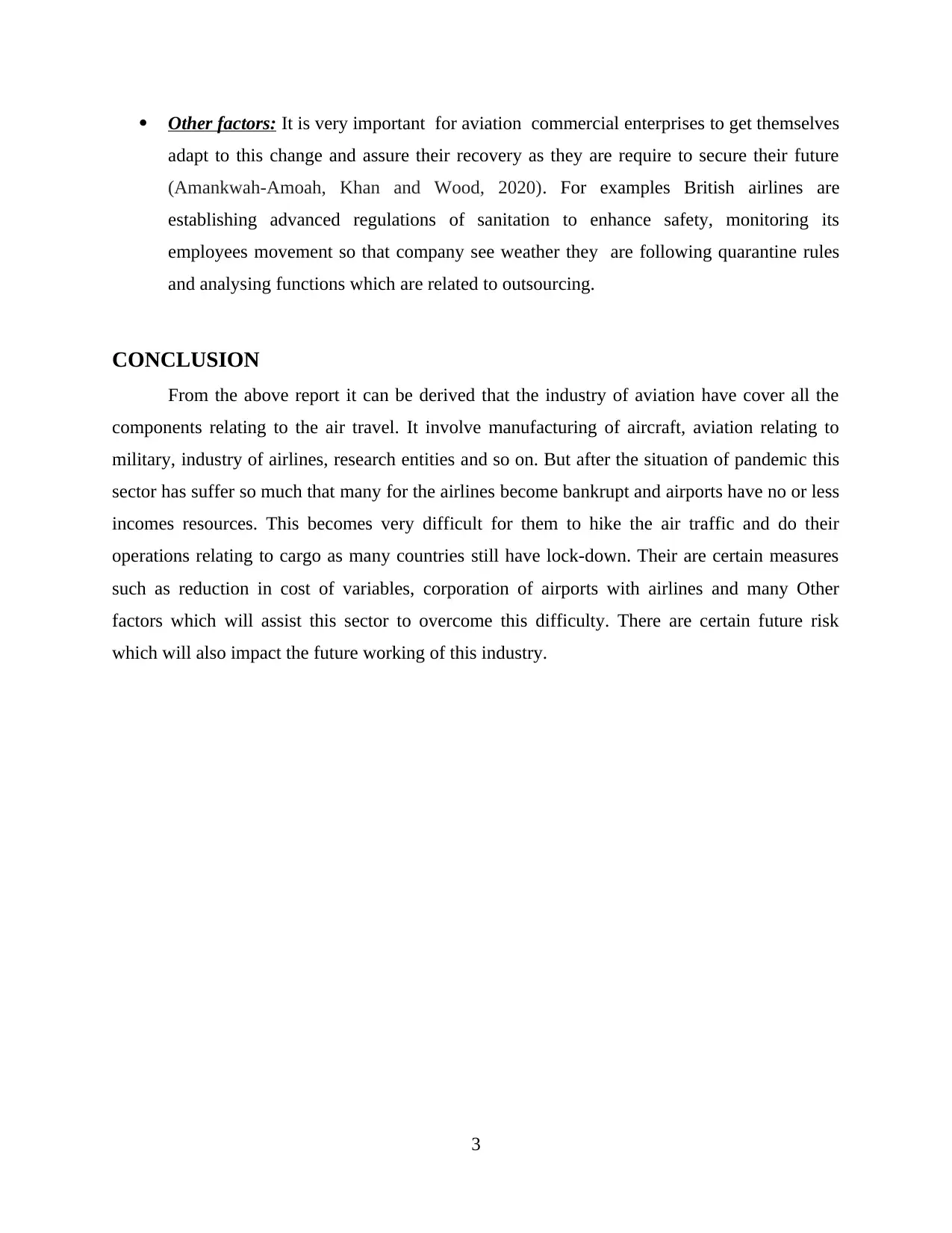
Other factors: It is very important for aviation commercial enterprises to get themselves
adapt to this change and assure their recovery as they are require to secure their future
(Amankwah-Amoah, Khan and Wood, 2020). For examples British airlines are
establishing advanced regulations of sanitation to enhance safety, monitoring its
employees movement so that company see weather they are following quarantine rules
and analysing functions which are related to outsourcing.
CONCLUSION
From the above report it can be derived that the industry of aviation have cover all the
components relating to the air travel. It involve manufacturing of aircraft, aviation relating to
military, industry of airlines, research entities and so on. But after the situation of pandemic this
sector has suffer so much that many for the airlines become bankrupt and airports have no or less
incomes resources. This becomes very difficult for them to hike the air traffic and do their
operations relating to cargo as many countries still have lock-down. Their are certain measures
such as reduction in cost of variables, corporation of airports with airlines and many Other
factors which will assist this sector to overcome this difficulty. There are certain future risk
which will also impact the future working of this industry.
3
adapt to this change and assure their recovery as they are require to secure their future
(Amankwah-Amoah, Khan and Wood, 2020). For examples British airlines are
establishing advanced regulations of sanitation to enhance safety, monitoring its
employees movement so that company see weather they are following quarantine rules
and analysing functions which are related to outsourcing.
CONCLUSION
From the above report it can be derived that the industry of aviation have cover all the
components relating to the air travel. It involve manufacturing of aircraft, aviation relating to
military, industry of airlines, research entities and so on. But after the situation of pandemic this
sector has suffer so much that many for the airlines become bankrupt and airports have no or less
incomes resources. This becomes very difficult for them to hike the air traffic and do their
operations relating to cargo as many countries still have lock-down. Their are certain measures
such as reduction in cost of variables, corporation of airports with airlines and many Other
factors which will assist this sector to overcome this difficulty. There are certain future risk
which will also impact the future working of this industry.
3
⊘ This is a preview!⊘
Do you want full access?
Subscribe today to unlock all pages.

Trusted by 1+ million students worldwide
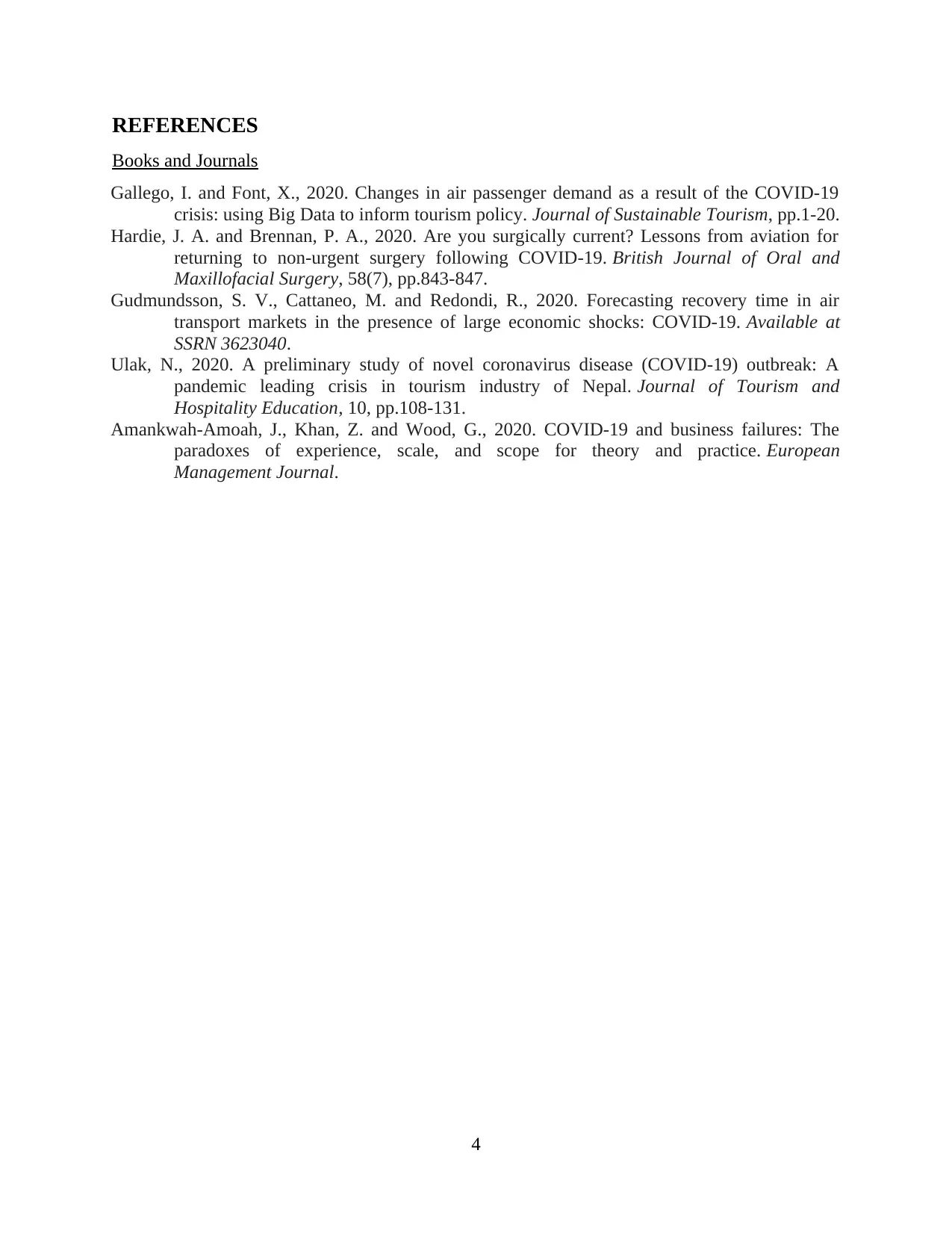
REFERENCES
Books and Journals
Gallego, I. and Font, X., 2020. Changes in air passenger demand as a result of the COVID-19
crisis: using Big Data to inform tourism policy. Journal of Sustainable Tourism, pp.1-20.
Hardie, J. A. and Brennan, P. A., 2020. Are you surgically current? Lessons from aviation for
returning to non-urgent surgery following COVID-19. British Journal of Oral and
Maxillofacial Surgery, 58(7), pp.843-847.
Gudmundsson, S. V., Cattaneo, M. and Redondi, R., 2020. Forecasting recovery time in air
transport markets in the presence of large economic shocks: COVID-19. Available at
SSRN 3623040.
Ulak, N., 2020. A preliminary study of novel coronavirus disease (COVID-19) outbreak: A
pandemic leading crisis in tourism industry of Nepal. Journal of Tourism and
Hospitality Education, 10, pp.108-131.
Amankwah-Amoah, J., Khan, Z. and Wood, G., 2020. COVID-19 and business failures: The
paradoxes of experience, scale, and scope for theory and practice. European
Management Journal.
4
Books and Journals
Gallego, I. and Font, X., 2020. Changes in air passenger demand as a result of the COVID-19
crisis: using Big Data to inform tourism policy. Journal of Sustainable Tourism, pp.1-20.
Hardie, J. A. and Brennan, P. A., 2020. Are you surgically current? Lessons from aviation for
returning to non-urgent surgery following COVID-19. British Journal of Oral and
Maxillofacial Surgery, 58(7), pp.843-847.
Gudmundsson, S. V., Cattaneo, M. and Redondi, R., 2020. Forecasting recovery time in air
transport markets in the presence of large economic shocks: COVID-19. Available at
SSRN 3623040.
Ulak, N., 2020. A preliminary study of novel coronavirus disease (COVID-19) outbreak: A
pandemic leading crisis in tourism industry of Nepal. Journal of Tourism and
Hospitality Education, 10, pp.108-131.
Amankwah-Amoah, J., Khan, Z. and Wood, G., 2020. COVID-19 and business failures: The
paradoxes of experience, scale, and scope for theory and practice. European
Management Journal.
4
1 out of 7
Related Documents
Your All-in-One AI-Powered Toolkit for Academic Success.
+13062052269
info@desklib.com
Available 24*7 on WhatsApp / Email
![[object Object]](/_next/static/media/star-bottom.7253800d.svg)
Unlock your academic potential
Copyright © 2020–2026 A2Z Services. All Rights Reserved. Developed and managed by ZUCOL.





